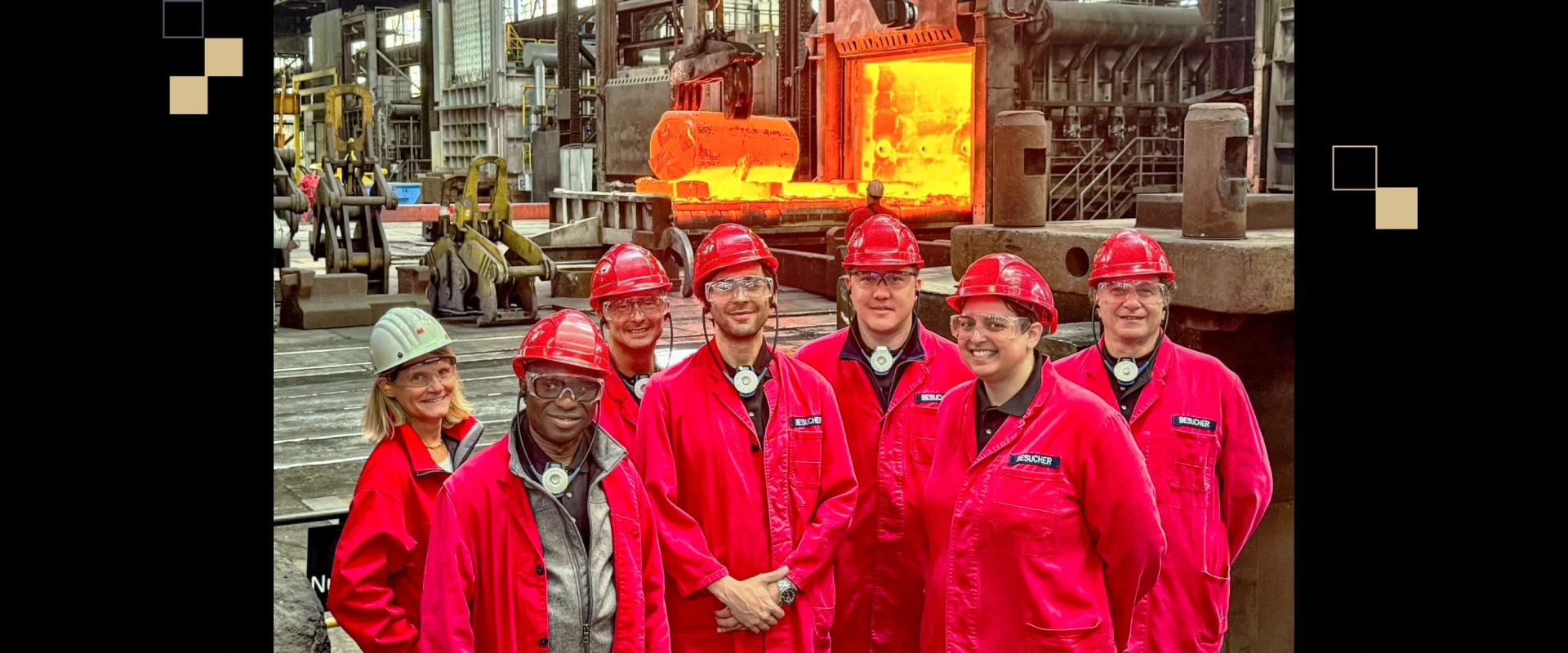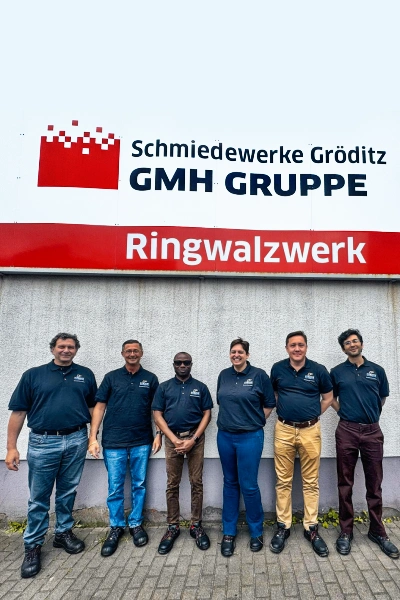
A group of online master’s students from Purdue’s Mitch Daniels School of Business recently stepped outside the virtual classroom for an experiential learning project with GMH Group (GMH), a major steel producer based in Germany. The project, led by Clinical Professor of Management Amy David, represented a unique blend of corporate consulting, academic rigor and global exposure.
“The corporate partner was able to get insights into the U.S. market for their product,” David says. “The student team brought a wealth of experience in various industries, such as oil and gas, automotive and industrial manufacturing. Combined with their coursework in the MBA and MSGSCM programs, they were able to do a deep analysis and apply various frameworks to their research to meet client needs.”
David says the students learned about managing a short-term consulting engagement and working with a variety of stakeholders. “We also collectively learned a lot about the steel industry and how foundational it is to the supply chains of so many industries,” she says.
Because they were online students and working from different locations, none of them had met in person until they arrived in Berlin. “Technology obviously played a big role in the team’s collaboration efforts,” David says. “As challenges arose, they were able to communicate regularly and make sure that team members got the support they needed from the rest of the group.”

Gokhan Merey was among the students who took part in the trip. “I wanted to gain a deeper understanding of how a major international company operates on the ground,” Merey says. “This experience allowed me to engage face-to-face with people I had only met virtually and to learn directly from a global manufacturing firm.”
He says it was exciting to work not just with a foreign company, but with a globally integrated manufacturer like GMH. “Knowing that their operations and customers span continents added a level of complexity that made the project even more engaging,” Merey says. “Seeing how such companies manage quality, compliance and innovation across borders helped me better appreciate the global dynamics behind industrial success.”
Merey describes working with his online cohort as a “fantastic experience. I had the privilege of working with four peers who each brought deep expertise and unique perspectives,” he says. “Despite my own time zone challenges and frequent work calls during the site visit, the team went out of its way to accommodate me.”
The biggest takeaway for Merey came on the factory floor. “I’ll never forget the moment the furnace door opened to release a steel block nearly 100 meters behind us. Even from that distance, we could feel the sudden wave of heat on the back of our necks,” he says. “As a team, we looked at each other in surprise; it was a powerful reminder of the physical intensity behind the steel industry.”
Opeyemi Asaolu was also a member of the student team. “I saw it as a unique opportunity to bridge academic learning with hands-on, global industry exposure,” he says. “As a professional with a background in electronics engineering and a career rooted in quality and manufacturing systems, I was especially interested in understanding how European manufacturers integrated business, management and global operations, and sustainability into their operations. It was an opportunity to gain not only insight into international supply chain practices, but also firsthand experience working across cultures in a real-world engineering setting.”
Personally, this experience reminded me how much growth can happen outside of your comfort zone. From factory floors to train stations, every moment was an education in adaptability, empathy and innovation. I left Germany more inspired than ever to lead change in engineering, both locally and globally. — Opeyemi Asaolu
Asaolu says working with an international manufacturer was eye-opening. “The company’s disciplined yet collaborative culture stood out,” he says. “GMH demonstrated a deep understanding of its engineering, which is typical to most German products, particularly in their materials handling and quality loops. There was also a notable emphasis on environmental responsibility — recycling and emissions tracking were not just regulatory requirements, but cultural values embedded in day-to-day operations.”
Meeting his online peers in person added an entirely new dimension to the collaboration, Asaolu says. “Conversations that were once limited to Teams sessions became richer, more spontaneous and more productive,” he says. “We each brought diverse experiences to the table, and seeing how those translated into real-time problem-solving in Germany was truly energizing. There was a level of mutual respect that made our teamwork efficient and memorable.”
The biggest takeaways for Alaolu emerged on multiple fronts. “Professionally, this experience reinforced the global nature of quality engineering in manufacturing,” he says. “Personally, it reminded me how much growth can happen outside of your comfort zone. From factory floors to train stations, every moment was an education in adaptability, empathy and innovation. I left Germany more inspired than ever to lead change in engineering — both locally and globally.”

Ali Ercan also joined the team for its real-world applications. “While the structure of our online program does a great job of replicating a collaborative classroom through live sessions, group projects and real-time discussions, there’s something uniquely valuable about being in the same room with your team,” he says. “This experience gave us the best of both worlds. It allowed five full-time professionals, who had only met through screens, to spend focused time together, problem-solving side by side and developing a stronger team identity while working on a real business challenge.”
Visiting and collaborating with GMH offered first-hand insight into how production strategies, customer engagement and market dynamics vary across borders. — Ali Ercan
Ercan says collaborating with an international manufacturer was professionally rewarding. “As someone who works in supply chain and studies global operations, I am very interested in how different regions approach the same challenges,” he says. “Visiting and collaborating with GMH offered first-hand insight into how production strategies, customer engagement and market dynamics vary across borders. It was also a reminder that building global supply chains isn’t just about physical movement. It’s about aligning teams, goals and expectations across cultures and time zones.”
Working with his online cohort was the most impactful part of the experience, Ercan says. “Our team brought together a rare mix of deep professional experience, genuine curiosity and a strong sense of commitment,” he says. “That combination created a team dynamic that pushed all of us to do our best work. We learned from each other and supported one another. Whether we were tackling research, refining slides or grabbing breakfast before site visits, the collaboration felt easy and natural. Working with this group set a high bar for what teamwork can look like in a graduate program.”
Like his teammates, Ercan points to numerous takeaways. “Watching die forging up close may not excite everyone, but the engineer in me loved it! We learned a lot from the GMH team, but just as much from each other throughout the project,” he says. “The experience offered both technical depth and strategic perspective.
Ercan says the personal takeaway was just as strong. “Meeting my professor and my peers in Berlin gave a whole new dimension to the online program,” he says. “It shifted how I see this experience. It’s not just about remote learning, but about building meaningful professional relationships, even across time zones. I know this experience will stay with me as a standout moment in my grad school journey, and I’m grateful to the team and Dr. David for making it so impactful.”